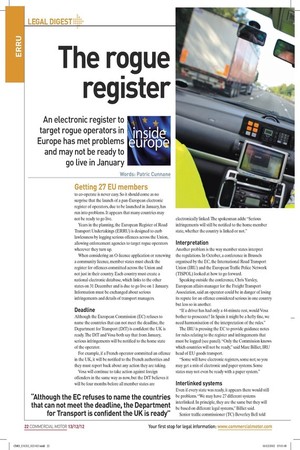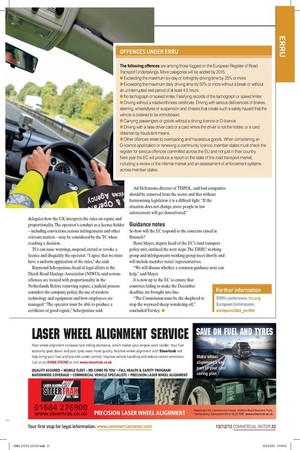The rogue register An electronic register to targe
Page 14

Page 15

If you've noticed an error in this article please click here to report it so we can fix it.
The rogue register An electronic register to target rogue operators in Europe has met problems and may not be ready to go live in January Getting 27 EU members to co-operate is never easy. So it should come as no surprise that the launch of a pan-European electronic register of operators, due to be launched in January, has run into problems. It appears that many countries may not be ready to go live.
Years in the planning, the European Register of Road Transport Undertakings (ERRU) is designed to curb lawlessness by logging serious offences across the Union, allowing enforcement agencies to target rogue operators wherever they turn up.
When considering an 0-licence application or renewing a community licence, member states must check the register for offences committed across the Union and not just in their country. Each country must create a national electronic database, which links to the other states on 31 December and is due to go live on 1 January. Information must be exchanged about serious infringements and details of transport managers.
Deadline Although the European Commission (EC) refuses to name the countries that can not meet the deadline, the Department for Transport (DfT) is confident the UK is ready. The DfT and Vosa both say that from January, serious infringements will be notified to the home state of the operator.
For example, if a French operator committed an offence in the UK, it will be notified to the French authorities and they must report back about any action they are taking.
Vosa will continue to take action against foreign offenders in the same way as now, but the DfT believes it will be four months before all member states are electronically linked. The spokesman adds: "Serious infringements will still be notified to the home member state, whether the country is linked or not."
Interpretation Another problem is the way member states interpret the regulations. In October, a conference in Brussels organised by the EC, the International Road Transport Union (IRU) and the European Traffic Police Network (TISPOL) looked at how to go forward.
Speaking outside the conference, Chris Yarsley, European affairs manager for the Freight Transport Association, said an operator could be in danger of losing its repute for an offence considered serious in one country but less so in another.
"If a driver has had only a 44-minute rest, would Vosa bother to prosecute? In Spain it might be a hefty fine, we need harmonisation of the interpretation of the rules."
The IRU is pressing the EC to provide guidance notes for rules relating to the register and infringements that must be logged (see panel). "Only the Commission knows which countries will not be ready," said Marc Billiet, IRU head of EU goods transport.
"Some will have electronic registers, some not; so you may get a mix of electronic and paper systems. Some states may not even be ready with a paper system."
Interlinked systems Even if every state was ready, it appears there would still be problems. "We may have 27 different systems interlinked. In principle, they are the same but they will be based on different legal systems," Billiet said.
Senior traffic commissioner (TC) Beverley Bell told delegates how the UK interprets the rules on repute and proportionality. The operator's conduct as a licence holder — including convictions, serious infringements and other relevant matters — may be considered by the TC when reaching a decision.
TCs can issue warnings, suspend, curtail or revoke a licence and disqualify the operator. "I agree that we must have a uniform application of the rules," she said.
Raymond Scherpenisse, head of legal affairs at the Dutch Road Haulage Association (NIWO), said serious offences are treated with proportionality in the Netherlands. Before removing repute, a judicial process considers the company policy, the use of modern technology and equipment and how employees are managed. "The operator must be able to produce a certificate of good repute," Scherpenisse said.
Ad Hellemons, director of TISPOL, said bad companies should be removed from the sector and that without harmonising legislation it is a difficult fight. "If the situation does not change, more people in law enforcement will get demotivated."
Guidance notes So how will the EC respond to the concerns raised in Brussels?
Remi Mayet, deputy head of the EC's land transport policy unit, outlined the next steps. The ERRU working group and infringements working group meet shortly and will include member states' representatives.
"We will discuss whether a common guidance note can help," said Mayet.
It is now up to the EC to ensure that countries failing to make the December deadline are brought into line.
"The Commission must be the shepherd to stop the wayward sheep wandering off," concluded Yarsley. • OFFENCES UNDER ERRU The following offences are among those logged on the European Register of Road Transport Undertakings. More categories will be added by 2015.
• Exceeding the maximum six-day or fortnightly driving time by 25% or more.
• Exceeding the maximum daily driving time by 50% or more without a break or without an uninterrupted rest period of at least 4.5 hours.
• No tachograph or speed limiter. Falsifying records of the tachograph or speed limiter.
• Driving without a roadworthiness certificate. Driving with serious deficiencies of brakes, steering, wheels/tyres or suspension and chassis that create such a safety hazard that the vehicle is ordered to be immobilised.
• Carrying passengers or goods without a driving licence or 0-licence.
• Driving with a false driver card or a card where the driver is not the holder, or a card obtained by fraudulent means.
• Other offences relate to overloading and hazardous goods. When considering an 0-licence application or renewing a community licence, member states must check the register for serious offences committed across the EU and not just in their country. Next year the EC will produce a report on the state of the road transport market, including a review of the internal market and an assessment of enforcement systems across member states.
Further information IERRU conference: iru.org European Commission: europa.eu/atoz_en.htm








































